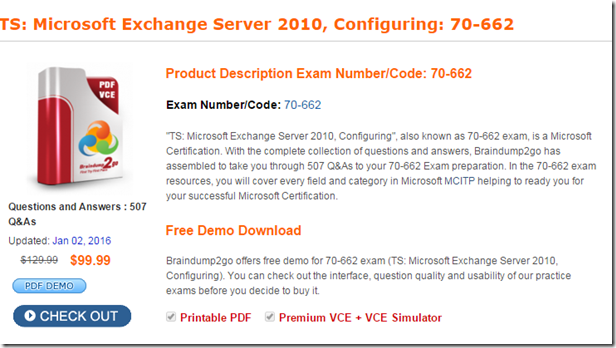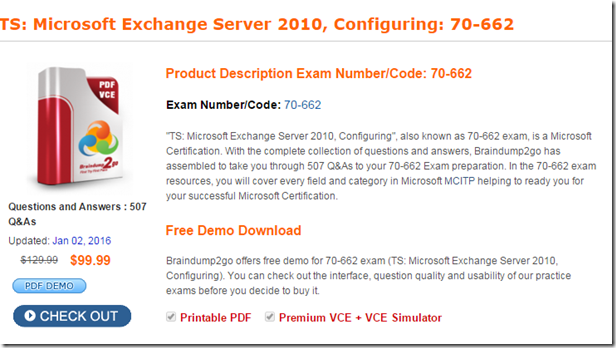MICROSOFT NEWS: 70-662 Exam Questions has been Updated Today! Get Latest 70-662 VCE and 70-662 PDF Instantly! Welcome to Download the Newest Braindump2go 70-662 VCE&70-662 PDF Dumps: http://www.braindump2go.com/70-662.html (507 Q&As)
2015 Microsoft 70-662 Certification Exam is coming! Getting a Laest 70-662 Practice Test is very important for an Exam Candiate! Braindump2go New Updated 70-662 Exam Questions Well Formatted in PDF and VCE versions, providing you convenience and excellence both at the same time! Free Questions and Answer are provided Following:
Exam Code: 70-662
Exam Name TS: Microsoft Exchange Server 2010, Configuring
Certification Provider: Microsoft
Corresponding Certifications: MCITP, MCITP: Enterprise Messaging Administrator on Exchange 2010, MCTS, MCTS: Microsoft Exchange Server 2010, Configuring
70-662 Dumps,70-662 PDF,70-662 PDF eBook,70-662 Braindump,70-662 Study Guide,70-662 Book,70-662 Practice Test,70-662 Dumps PDF,70-662 VCE,70-662 VCE Dumps,70-662 Valid Dumps,70-662 Exam Questions Free,70-662 Dumps,70-662 Free Dumps,70-662 Questions and Answers Free,70-662 Braindump PDF,70-662 Braindump VCE,70-662 Preparation

QUESTION 341
Which option should you choose to configure User1’s mailbox so that all messages that are sent to User1’s mailbox are also delivered to the Compliance Mailbox?
A. Organization Configuration -> Mailbox
B. Organization Configuration -> Client Access
C. Organization Configuration -> Hub Transport
D. Server Configuration -> Mailbox
E. Server Configuration -> Client Access
F. Server Configuration -> Hub Transport
G. Recipient Configuration -> Mailbox
H. Recipient Configuration -> Client Access
I. Recipient Configuration -> Hub Transport
Answer: G
Explanation:

QUESTION 342
What command would you use to block messages from servers that are known for sending spam?
A. Test-IPBlockListProvider
B. Set-IPBlockListProvider
C. Add-IPBlockListEntry
D. Set-IPAllowListProvider
Answer: B
Explanation:
You use the Add-IPBlockListProvider, Set-IPBlockListProvider, and Remove-IPBlockListProvider cmdlets to manage the IP Block List Provider services you use in your organization. The following example adds a new IP Block List provider service called “Contoso IP Block List Provider”, and configures it to use bitmask matching for 127.0.0.1 (block messages from IP addresses that are on the block list):
Add-IPBlockListProvider -Name “Contoso IP Block List Provider” –LookupDomain
“contoso.com” – BitMaskMatch 127.0.0.1
The following example configures the same IP Block List provider service to use a custom rejection response:
Set-IPBlockListProvider “Contoso IP Block List Provider” -RejectionMessage “Your message was rejected because the IP address of the server sending your message is in the block list of contoso.com IP Block List Provider service”
You use the Add-IPBlockListEntry and Remove-IPBlockListEntry cmdlets to manage the addresses in the IP Block list. You can specify individual IP addresses, IP subnets using the CIDR notation, or IP ranges.
The following example adds the IP address 192.168.0.100 to the IP Block list.
Add-IPBlockListEntry-IPAddress 192.168.0.100
QUESTION 343
You have an Exchange 2010 SP1 organization with the following configuration:
Server1 roles – mailbox, hub transport
Server2 roles – client access server
Server1 holds the public folder database.
Which command would you use first to remove public folder database?
A. Set-MailboxDatabase
B. Remove-PublicFolder
C. Remove-PublicFolderDatabase
D. Get-MailboxDatabase
Answer: B
Explanation:
You have to remove all the public folders from a public folder database before you remove the database.
Remove-PublicFolder -Identity “\My Public Folder” -Recurse: $True
Then, before you remove the database you must make sure it is not the default public folder database for the mailbox database. If so, you must set another as default before removing it.
Reference:
http://technet.microsoft.com/en-us/library/aa997202.aspx
http://technet.microsoft.com/en-us/library/dd876883.aspx
QUESTION 344
You deploy a Monitor Server srvApp1.
You want to allow the server to send notification mails to an administrator through the relay domain.
Which option should you use?
A. hub transport rule
B. send connector
C. receive connector
D. edge subscription
E. accepted domain
F. remote domain
Answer: C
Explanation:
We have a server that will need to send e-mails to an external administrator. We would have to build a receive connector for use by that server.
Reference:
http://exchangeserverpro.com/how-to-configure-a-relay-connector-for-exchange-server-2010
QUESTION 345
You need to ensure that 10 new room mailboxes automatically accept meeting requests.
Which cmdlet should you run?
A. SetCalendarNotification
B. SetCalendarProcessing
C. SetMailboxAutoReplyConfiguration
D. SetMailboxCalendarConfiguration
Answer: B
Explanation:
Set-CalendarProcessing -Identity “Conf 212”-AutomateProcessing AutoAccept-DeleteComments $true-AddOrganizerToSubject $true-AllowConflicts $false
http://technet.microsoft.com/en-us/library/dd335046.aspx
QUESTION 346
You have an Exchange Server 2003 organization.
You install a new Exchange Server 2010 server in the organization.
You need to ensure that you can modify the default email address policy by using the Exchange Management Console (EMC).
What should you do?
A. Run the SetEmailAddressPolicy cmdlet
B. Run the UpdateEmailAddressPolicy cmdlet.
C. From the Exchange System Manager, modify the properties of the default recipient policy.
D. From the EMC, select the Email Address Policies tab, rightclick Default Policy, and then click
Apply.
Answer: A
Explanation:
When going from Exchange 2003 to Exchange 2010, you’ll want to upgrade the default email address policy.
To do so, you must run the following command:
Set-EmailAddressPolicy “Default Policy” – IncludedRecipients AllRecipients
Once upgraded, you’ll be able to use the EMC to manage it.
Reference:
http://technet.microsoft.com/en-us/library/dd351283.aspx
QUESTION 347
Your company has an Exchange Server 2010 Hub Transport server named Hub1.
Hub1 receives all email sent to the company from the Internet.
You install the antispam agents on Hub1.
You need to ensure that Hub1 only accepts messages sent to email addresses listed in Active Directory.
What should you do?
A. Modify the properties of the Sender Filtering agent.
B. Modify the properties of the Recipient Filtering agent.
C. Modify the properties of the default Accepted Domain.
D. Modify the properties of the default Receive Connector.
Answer: B
Explanation:
http://technet.microsoft.com/en-us/library/bb123891.aspx

QUESTION 348
You have an Exchange Server 2010 Service Pack1 (SP1) organization.
The organization contains the servers configured as shown in the following table:
The Mailbox servers are members of a database availability group (DAG) named DAG1.
You need to configure DAG1 to use a static IP of 192.168.1.100.
Which Windows PowerShell cmdlet should you run?

A. Set-MailboxServer.
B. Set-DatabaseAvailabilityGroup.
C. New-DatabaseAvailabilityGroup.
D. Add-MailboxDatabaseCopy.
E. Add-DatabaseAvailabilityGroupServer.
F. Set-MailboxDatabase.
G. Set-ClientAccessServer.
H. Set-ClientAccessArray.
I. Set-PublicFolderDatabae.
J. New- PublicFolderDatabase.
K. Add-RoleGroupMember.
L. Set-MailbxDatabaseCopy.
M. New-MailboxDatabase.
Answer: B
Explanation:
Set-DatabaseAvailabilityGroup -Identity DAG1-DatabaseAvailabilityGroupIpAddresses 192.168.1.100
http://technet.microsoft.com/en-us/library/dd297934.aspx
QUESTION 349
You have an Exchange organization named contoso.com.
All servers in the organization have Exchange Server 2010 SP1 installed.
The organization contains a mail-enabled domain local group name Group1.
Users from outside the organization report that all email messages sent to [email protected] generate a non-delivery report (NDR).
You need to ensure that users from outside the organization can successfully send email to [email protected].
What should you modify for Group1?
A. The advanced settings.
B. The mail flow settings.
C. The group scope.
D. The group type.
Answer: B
Explanation:
By default the Message Delivery Restrictions, under the Mailflow options, are set to require that all senders to group mailboxes are authenticated locally by the server. This is not acceptable if the group will be accepting mail from external domains, so the following checkbox should be unticked:

QUESTION 350
You have an Exchange Server 2010 Service Pack1 organization.
The organization contains a Hub Transport server named Server1 and an Edge Transport sever named Server2.
All servers are configured to use an internal DNS server named DNS1 for host resolution.
You configure an Edge Subscription from Server1 to Server2.
You need to modify the delayed acknowledgment (ACK) setting of Server2.
What should you do?
A. From the Exchange Management Console (EMC), modify the properties of the accepted
domain.
B. From the Exchange Management Console (EMC), create a transport rule.
C. From the Exchange Management Shell, run the Set-TransportServer cmdlet.
D. From the Exchange Management Shell, run the Set-ReceiveConnector cmdlet.
E. From the Exchange Management Console (EMC), disable the IP Block List feature.
F. From the Exchange Management Shell, run the Set-TransportAgent cmdlet.
G. From the Exchange Management Shell, run the Set-TransportConfig cmdlet.
H. From the Exchange Management Console (EMC), modify the properties of the remote
domain.
Answer: D
Explanation:
http://technet.microsoft.com/en-us/library/hh529935.aspx
Braindump2go New Released 70-662 Dump PDF Free Download, 507 Questions in all, Passing Your Exam 100% Easily!

FREE DOWNLOAD: NEW UPDATED 70-662 PDF Dumps &70-662 VCE Dumps from Braindump2go: http://www.braindump2go.com/70-662.html 507 Q&As)

